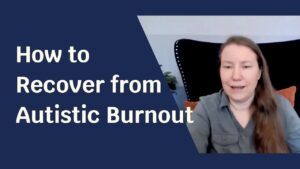You want things to be better
I’m glad the topic of autistic burnout is getting more attention, and that people are figuring out what’s been going on with them.
The natural question then becomes, how do you get out of it? How do you recover?
I’ve recovered from two severe, years-long burnouts, and several weeks-to-months-long ones. I’ve also been burnout free since 2015!
Over the last few years, I’ve been helping others create their own versions of this journey. The specifics of how we each do it are different for everyone, because we all have different lives, experiences, personalities, etc.
Nevertheless, there are some pretty consistent patterns, and my pattern-loving brain has synthesized my own take on what it takes to get out of burnout.
Others may tell you differently. Use your own best judgment and figure out what works for you.
What is recovery?
So what does recovery look like? This confuses a lot of people at first.
Let me state clearly that if you build up some energy and go right back to doing the exact same things that got you into this mess in the first place, that is not recovery. It will simply cause a relapse.
I did that several times. Many people yo-yo like that many times and wonder what’s wrong with them. Nothing is wrong with them, but they aren’t in a position to be their best self.
Again, working harder to function in an unhealthy way, in an unhealthy environment, does not create health.
Let me say this a third way, because this is so important. If doing things the way you’ve been doing them is leading to burn out, having more energy to do those same things even more and for longer, isn’t going to give you a better life. It will lead to relapse.
The only way “recovery” will be sustainable is if you make a new life that works with your brain instead of against it. A life that works with your brain and body and medical needs and life experiences and traumas and passions and all of the parts of who you are.
Without further ado, here’s my five part plan to recover from autistic burnout.
The 5 parts
Okay, okay, one final note. I’ve grouped these into parts, not steps. These aren’t sequential, and you will likely move back-and-forth between them many times before you’ve created your fully-recovered, newly autism-positive life.
Part 1: Unlearn internalized criticism
When you’re in the depths of burnout, you may not have the energy to make concrete changes to your life. You don’t have to. You can start with purely mental changes.
Are there things that you say to yourself that you would never say aloud? Criticism that you level against yourself that would be considered abuse if you said them to someone else?
Here’s the kicker: what happens when you tell yourself that you’re [fill in the blank]? Are you more motivated and interested in doing the thing? Or do you do it but it’s forcing yourself? Or do you procrastinate, want to eat, scroll through social media, shut down, or lash out? Does it drain your energy or give you energy?
Everything in burnout recovery comes down to energy management. Does something give you energy or cost you energy?
Finding and unlearning all the different kinds of negative self-talk that you’ve picked up over the years makes an enormous difference in energy, anxiety, stress, black-and-white thinking, motivation, ability to communicate with others, and spreads throughout every area of life.
Part 2: Reduce stressors
This is the part where you find the things that are draining your energy and change, improve, or get rid of them, as appropriate.
This can include anything from unmet sensory needs to people who are emotionally abusive, passive aggressive or pressuring you.
Find anything and everything that drains your energy. You don’t necessarily need to change any of it right away, unless you want to and have the energy to do that. Simply noticing and learning more about yourself can make a big difference.
Start asking yourself questions like:
- Does this give me energy or drain it?
- Do I feel better after I do this or worse?
- What about this situation is bothering me? Or feels restorative?
- Am I more/less functional, more/less communicative, more/less able to deal with things after I do this?
Look for patterns and changes in patterns for clues to what things are helpful or hurtful to you. You may be surprised.
Part 3: Gift yourself rest
When you don’t have energy to do things, don’t do things. It’s a simple as that.
And yes, I get that it is not always that simple. There are things that need doing. Children to feed. Bosses to placate. Partners to communicate with.
And, as much as possible, when possible, to whatever extent possible, let yourself off the hook for as much as you can.
Even if it’s putting off some less important project for now. Or deciding that you really don’t have to do laundry today, or that people probably won’t hate you forever if they don’t get an email back right away.
Take moments, hours, days when you can come on and do less, or even nothing. Without guilt (okay, there might be some guilt, so go back to part one and work through some more of that internalized criticism).
Part 4: Make small changes, slowly
And whenever you have a bit of energy, you can make small changes towards experimenting with options that might suit you better.
Actually making changes will take patience, creativity, and trial and error. You won’t always get it right the first time, or the dozenth, and sometimes you will. Either way is completely fine.
You’re forging your own way ahead. It’s not a clearly marked path like the one that ableist society tried to get you to follow (but how well did that work out?). So it’s not going to be clear and straightforward, yet you can figure it out. You can figure yourself out.
So, when you have a tiny little bit of energy to work with, change a tiny little bit, or figure out a little bit more about yourself, even if it is asking questions and processing your internal reactions to things.
If a change frees up a little bit of energy, you can use that to find more things, make more tiny changes, some of which will free up a bit more energy, and you’ll gradually work your way toward a genuinely better situation.
Over time, those small changes will add up to make a significant positive impact throughout many areas of your life.
Even the areas where you can’t make any changes will be easier to deal with because you’ll have more energy from the parts of your life that you can make improvements in.
My caution here is that if you free up that energy and then go right back to doing the same types of things, or being in the same types of environments, or thinking the same types of thoughts that got you into it in the first place, you’re going to find another autistic burnout around the corner.
That happened to me multiple times before I genuinely changed enough (especially the internal stuff) that I did not fall back into the old habits end it finally became sustainable. That’s how I’ve managed to stay burnout free since 2015.
Now I am much better at recognizing when I’m starting to overdo it, and I can pull back without the internal monologue of fear and shame. I know when I need to rest a bit, or get out in nature, or stay home, or reach out to someone for comfort, or try something new for a change.
I’m much better at communicating my needs as well, because communicating isn’t as riddled with anxiety and shame and fear. So I’m more likely to get the support I need when I need it.
Part 5: Give yourself credit!
Remind yourself frequently that you’re in this mess because our modern society is designed to be disadvantageous to our neurotype. That’s not your personal failure. And just existing in this world takes so much more work for you than for others.
So your every accomplishment means far more than it does coming from others.
You’re doing amazing at tackling huge monumental tasks daily with with minimal resources. When those minimal resources aren’t enough for other’s expectations, it’s not your personal failure.
Your past, too, is a series of events in which you struggled mightily and worked far harder than others, with limited tools to get the job done, and you did your absolute best at any given moment. If others didn’t see it, that’s their fault, not yours.
Last thoughts
Sustainable recovery means creating a new internal and external reality that is kind to your neurology, sensory needs, personal history, and identity in all its wonderful aspects.
Your new life may look completely different than the current one, or only a little different. Sometimes the internal stuff is much much bigger deal than the external stuff. Sometimes it’s the external stuff that’s a bigger deal and needs more change.
Your journey will be unique, but you are not alone.
It is possible you can do it yourself, but it’s easier with support. That might be a friend or family member, or a few. It might be an autistic life coach or therapist. I’ve made a dedicated course to support you in this process. It might even include random people that you find along the way. Most likely it will be a combination that will evolve over time.
It all starts with you wanting it badly enough to use any scrap of energy you have to find the first tiny thing that you want to make better.
This is a topic that matters a great deal to me, so I will return to it over and over. Here’s a recording of a free workshop I gave with more of my take on it. What are your thoughts and experiences? You’re welcome to leave comments below.





5 Responses
Wow! This is soooo hugely helpful!!! Extra happy girl here that I discovered you and your page!!!
Hello I’m a newly diagnosed Afab that is deeply in burnout after basically an entire life masking and awaiting diagnosis for chronic illness but I’m still being forced to go to school and can’t do it. It will take years to recover but I’ll have missed my final exams by then. I feel like I need to go to a mental hospital and found this while reaserching ones I could go to. I need advice on what to do please.
Hi there, that’s a really difficult situation that you’re in. Unfortunately, there’s no easy or quick fix. Even going to a mental hospital is only going to be the start of a long journey of recovery. And whether you do that, or stay in school, there are going to be disruptions to the current path you are on, that are going to create ripple effects in your life.
I can’t tell you what to do, but I would invite you to consider what you are more capable, at this point in your life, of dealing with. And I would put it in terms of freedom: Does it feel more like freedom to leave school and seek help for your chronic illness and mental health and other things that you’ve been figuring out about yourself recently, and deal with the fallout from that? Or does it feel more like freedom to stay on your current path and meet the expectations placed in front of you, and deal with the fallout from health issues? I genuinely don’t know the answer to that. But something in you does.
When we’re working towards freedom, it is generally easier to deal with the consequences then when we’re trying to do what we “should” do. Even when objectively it may look like a more difficult route.
Those are my thoughts. Ultimately it is always your choice. I wish you well in this difficult circumstance.
Heather
Where do I go for help with autistic burnout?
Start with the principles on this page. Here’s more in depth: https://www.autismchrysalis.com/2023/01/19/recovering-from-autistic-burnout/. And I’m currently creating a course on how to recover from Autistic burnout, that will be coming out in a few months.